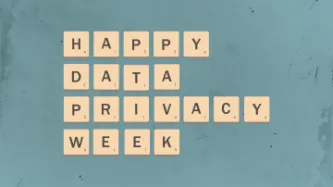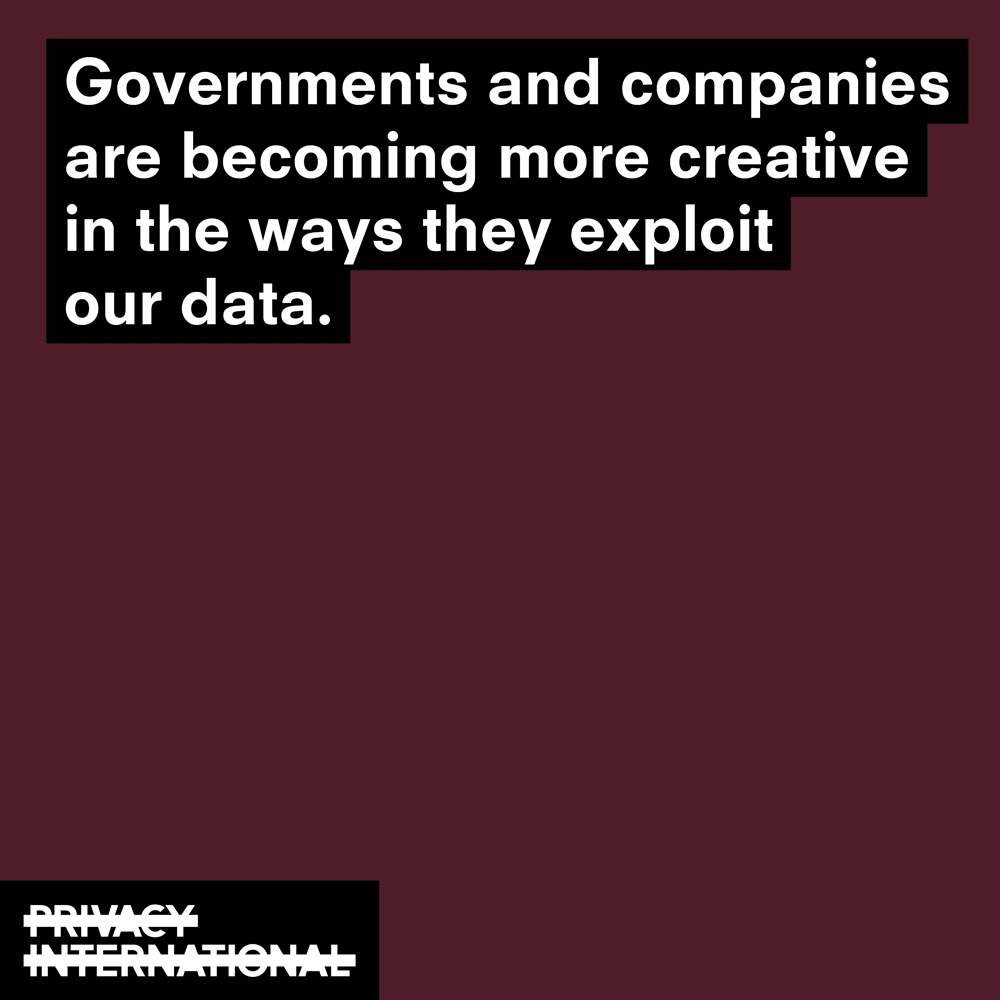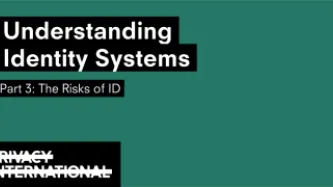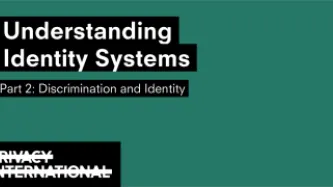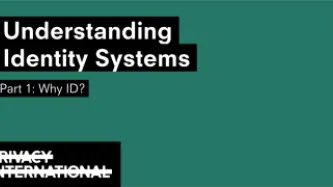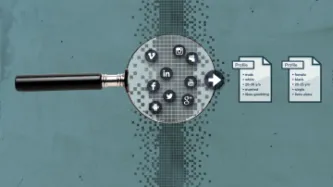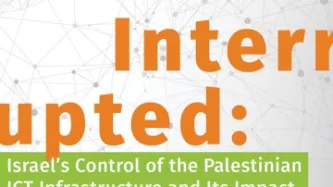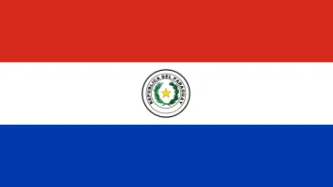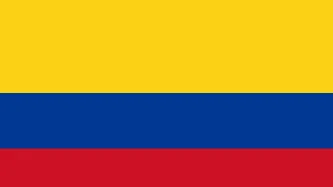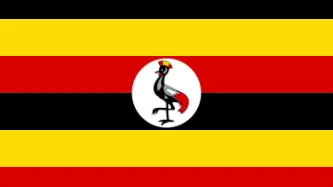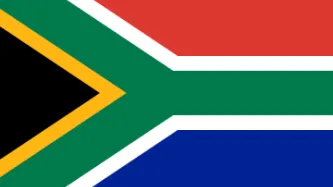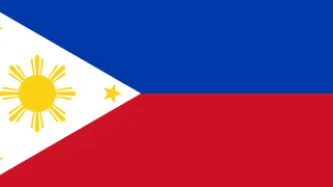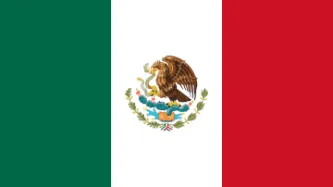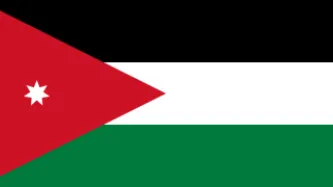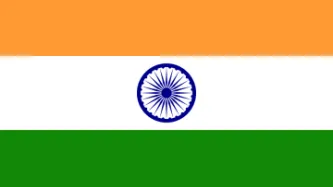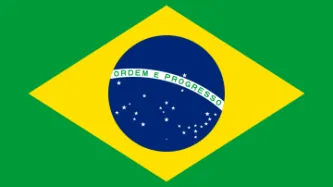Search
Content type: News & Analysis
Palantir and the UN’s World Food Programme (WFP) are partnering for a reported $45 million. Palantir, a US-based company that sells data software and has been the centre of numerous scandals.
The World Food Programme provides assistance in food and nutrition to around 92 million people each year. Systems that are produced in agreements such as the one between WFP and Palantir increase risks to the people the they are attempting to help. There are risks to both individuals and whole populations…
Content type: News & Analysis
Dear will.i.am,
We saw your piece in the Economist and were very excited to learn that you care about privacy as much as we do. At PI we expose government and corporate bad behaviours, we disrupt their plans, and identify a hopeful path forward.
That’s why we very much agree with you that people need much more protection, transparency and control over their personal data. Cheers for: “I want to have it clearly explained in plain language who has access to my camera, to my photos, who’s…
Content type: Long Read
Over the past year, the Privacy International Network has uncovered, campaigned, and advocated on how trends in surveillance and data exploitation are increasingly affecting our right to privacy.
To celebrate Data Privacy Day on 28 January, we shared a full week of stories and research, exploring how countries are addressing data governance, and the implications for our security and privacy.
Monday - Exposing Harms, Fighting Back
It is often communities who are already the most…
Content type: Long Read
During the last World Economic Forum in Davos, the CEO of Microsoft joined the chorus of voices calling for new global privacy rules, saying the following in regard to the new European General Data Protection Regulation (GDPR):
“My own point of view is that it's a fantastic start in treating privacy as a human right. I hope that in the United States we do something similar, and that the world converges on a common standard."
We have come a long way. From tech companies fighting and…
Content type: Long Read
The Privacy International Network is celebrating Data Privacy Week, where we’ll be talking about how trends in surveillance and data exploitation are increasingly affecting our right to privacy. Join the conversation on Twitter using #dataprivacyweek.
Since 2014, the Privacy International Network has produced State of Privacy reports, a collaborative effort to record global privacy and related issues.
As we close Data Privacy Week this year, we’re pleased to share an update of the…
Content type: Explainer
This is the third part of Understanding Identity Systems. Read Part 1: Why ID?, and Part 2: Discrimination and Identity.
Biometrics
Biometrics are the physiological and behavioural characteristics of individuals. This could be fingerprints, voice, face, retina and iris patterns, hand geometry, gait or DNA profiles. However, the legal definition of ‘biometrics’ may differ – in some contexts, it may be defined by law, whereas in others it may not have, or only have…
Content type: Explainer
This is the second part of Understanding Identity Systems. Read Part 1: Why ID?, and Part 3: The Risks of ID.
The existing identity landscape
Every country has an existing landscape of ways in which people can identify themselves. This can include an existing ID card system, but also a range from birth registration, to passports, to driver licenses. The effectiveness of these systems may be unevenly distributed, or otherwise problematic.
The nature of the existing ID landscape…
Content type: Explainer
Introduction
Of all the data-intensive initiatives that a government can introduce, some of the largest are ID systems. They have implications across a broad range of human and civil rights. How do we begin to critique an ID system, to begin to understand its strengths and weaknesses? There are a series of issues that we believe should be addressed in the development of any ID system.
This could be of particular relevance to civil society organisations (CSOs): this is because civil…
Content type: Long Read
The Privacy International Network is celebrating Data Privacy Week, where we’ll be talking about how trends in surveillance and data exploitation are increasingly affecting our right to privacy. Join the conversation on Twitter using #dataprivacyweek.
Innovations in surveillance and data exploitation present challenges in the fight to protect personal data across the world. Since 1990 we have been working to build a global movement through working with others - from leading civil society…
Content type: Long Read
The Privacy International Network is celebrating Data Privacy Week, where we’ll be talking about how trends in surveillance and data exploitation are increasingly affecting our right to privacy. Join the conversation on Twitter using #dataprivacyweek.
In the era of smart cities, the gap between the internet and the so-called physical world is closing. Gone are the days, when the internet was limited to your activities behind a desktop screen, when nobody knew you were a dog.
Today, the…
Content type: Examples
In January 2019, it was discovered that the HIV-positive status of 14,200 people in Singapore, as well as their identification numbers and contact details, had been leaked online. According to a statement of the Ministry of Health, records leaked include 5,400 Singaporeans diagnosed as HIV-positive before January 2013, and 8,800 foreigners diagnosed before December 2011. Patient names, identification numbers, phone numbers, addresses, HIV test results and medical information was included in the…
Content type: Long Read
The Privacy International Network is celebrating Data Privacy Week, where we’ll be talking about how trends in surveillance and data exploitation are increasingly affecting our right to privacy. Join the conversation on Twitter using #dataprivacyweek.
It is no mystery that data exploitation is part of most consumer-oriented tech companies’ business models. A big part of our lives is recorded and exploited, from our web searches, to our personal communications, location, and our shopping habits…
Content type: Long Read
The Privacy International Network is celebrating Data Privacy Week, where we’ll be talking about how trends in surveillance and data exploitation are increasingly affecting our right to privacy. Join the conversation on Twitter using #dataprivacyweek.
It is often communities who are already the most marginalised who are at risk because of the privacy invasions of data-intensive systems. Across the globe, we see the dangers of identity systems; the harms of online violence against women and the…
Content type: News & Analysis
Campaigners are today calling for urgent action to allow Palestinians to develop an independent telecommunications infrastructure following the release of a report detailing how the Israeli government exerts its existing control to rule and monitor the online lives of Palestinian people.
‘Connection Interrupted’, produced by Privacy International partner organisation 7amleh, describes how the Israeli government restricts key telecommunications infrastructure in Palestine,…
Content type: State of Privacy
Table of contents
Introduction
Right to Privacy
Communication Surveillance
Data Protection
Identification Schemes
Policies and Sectoral Initiatives
Introduction
Acknowledgement
The State of Privacy in Paraguay is the result of an ongoing collaboration by Privacy International and TEDIC in Paraguay.
Key privacy facts
1. Constitutional privacy protection: The constitution does not mention the word privacy but protects private life under the "right to intimacy."
2. Data protection…
Content type: State of Privacy
Table of contents
Introduction
Right to Privacy
Communication Surveillance
Data Protection
Identification Schemes
Policies and Sectoral Initiatives
Introduction
Acknowledgment
The State of Privacy in Lebanon is the result of an ongoing collaboration between Privacy International and SMEX.
Key privacy facts
1. Constitutional privacy protection: The Lebanon constitution does not explicitly mention the right to privacy.
2. Data protection law: The Electronic Transactions and…
Content type: State of Privacy
Table of contents
Introduction
Right to Privacy
Communication Surveillance
Data Protection
Identification Schemes
Policies and Sectoral Initiatives
Introduction
Acknowledgement
The State of Privacy in Colombia is the result of an ongoing collaboration by Privacy International and Fundación Karisma and Dejusticia.
Key Privacy Facts
1. Constitutional privacy protection: The constitution contains an explicit protection of the right to privacy (Article 15 of the 1991 constitution).
2…
Content type: State of Privacy
Table of contents
Introduction
Right to Privacy
Communication Surveillance
Data Protection
Identification Schemes
Policies and Sectoral Initiatives
Introduction
Acknowledgement
The State of Privacy in Uganda is the result of an ongoing collaboration by Privacy International and Unwanted Witness.
Key privacy facts
1. Constitutional privacy protection: The constitution contains an explicit protection of the right to privacy (Art. 27).
2. Data protection law: There is no…
Content type: State of Privacy
Table of contents
Introduction
Right to Privacy
Communication Surveillance
Data Protection
Identification Schemes
Policies and Sectoral Initiatives
Introduction
Acknowledgment
The State of Privacy in South Africa is the result of an ongoing collaboration by Privacy International and the Right2Know coalition.
Key Privacy Facts
1. Constitutional privacy protections: Section 14 of the Constitution of the Republic of South Africa protects the right to privacy.
2. Data protection laws…
Content type: State of Privacy
Table of contents
Introduction
Right to Privacy
Communication Surveillance
Data Protection
Identification Schemes
Policies and Sectoral Initiatives
Introduction
Acknowledgement
The State of Privacy in the Philippines is the result of an ongoing collaboration by Privacy International and Foundation for Media Alternatives.
Key privacy facts
1. Constitutional privacy protection: The constitution contains an explicit protection of the right to privacy (Art. III, section 3).
2.…
Content type: State of Privacy
Table of contents
Introduction
Right to Privacy
Data Protection
Identification Schemes
Policies and Sectoral Initiatives
Introduction
Acknowledgment
The State of Privacy in Pakistan is the result of an ongoing collaboration by Privacy International and the Digital Rights Foundation.
Between 2014-2016, Bytes for All contributed to previous versions of the 'Data Protection' sections of this briefing.
Key Privacy Facts
1. Constitutional privacy protections: Article 14(1) of…
Content type: State of Privacy
Table of contents
Introduction
Right to Privacy
Communication Surveillance
Data Protection
Identification Schemes
Policies and Sectoral Initiatives
Introduction
Acknowledgment
The State of Surveillance in Morocco is the result of an ongoing collaboration by Privacy International and its partners.
Key privacy facts
1. Constitutional privacy protection: The constitution contains an explicit protection of the right to privacy.
2. Data protection law: There is a data…
Content type: State of Privacy
Table of contents
Introduction
Right to Privacy
Communication Surveillance
Data Protection
Identification Schemes
Policies and Sectoral Initiatives
Introduction
Acknowledgement
The State of Privacy in Mexico is the result of an ongoing collaboration by Privacy International and Red in Defensa de los Derechos Digitales (R3D) in Mexico.
Key Privacy Facts
1. Constitutional privacy protections: The right to privacy is enshrined in article 6 of the Mexican constitution.
2. Data…
Content type: State of Privacy
Table of contents
Introduction
Right to Privacy
Communication Surveillance
Data Protection
Identification Schemes
Policies and Sectoral Initiatives
Introduction
Acknowledgement
The State of Privacy in Kenya is the result of an ongoing collaboration by Privacy International and the National Coalition of Human Rights Defenders - Kenya.
Key Privacy Facts
1. Constitutional privacy protections: Article 31 of the Kenyan Constitution specifically protects the right to privacy.
2. Data…
Content type: State of Privacy
Table of contents
Introduction
Right to Privacy
Communication Surveillance
Data Protection
Identification Schemes
Policies and Sectoral Initiatives
Introduction
Acknowledgement
The State of Privacy in Jordan is the result of an ongoing collaboration by Privacy International and 7iber.
Key privacy facts
1. Constitutional privacy protections: Article 18 of the Jordanian constitution contains an explicit mention of privacy.
2. Data protection laws: There is currently no data…
Content type: State of Privacy
Table of contents
Introduction
Right to Privacy
Communication Surveillance
Data Protection
Identification Schemes
Policies and Sectoral Initiatives
Introduction
Acknowledgment
The State of Privacy in Indonesia is the result of an ongoing collaboration by Privacy International and The Institute for Policy Research and Advocacy (ELSAM).
Key privacy facts
Key privacy facts
1. Constitutional privacy protection: The constitution does not explicitly mention privacy.
2. Data protection…
Content type: State of Privacy
Table of contents
Introduction
Right to Privacy
Communication Surveillance
Data Protection
Identification Schemes
Policies and Sectoral Initiatives
Introduction
Acknowledgement
The State of Privacy in India is the result of an ongoing collaboration by Privacy International and the Centre for Internet & Society.
Key Privacy Facts
1. Constitutional privacy protections: In 2017, the Indian Supreme Court ruled that the Indian constitution guarantees a right to privacy.
2. Data…
Content type: State of Privacy
Table of contents
Introduction
Right to Privacy
Communication Surveillance
Data Protection
Identification Schemes
Policies and Sectoral Initiatives
Introduction
Acknowledgment
The State of Surveillance in Egypt is the result of an ongoing collaboration by Privacy International and its partners.
Key privacy facts
1. Constitutional privacy protection: The constitution contains an explicit protection of the right to privacy.
2. Data protection law: In August 2018, the Cabinet…
Content type: State of Privacy
Table of contents
Introduction
Right to Privacy
Communication Surveillance
Data Protection
Identification Schemes
Policies and Sectoral Initiatives
Introduction
Acknowledgement
The State of Privacy in Brazil is the result of an ongoing collaboration by Privacy International and Coding Rights.
Between 2014-2017, Privacy LatAm contributed to previous versions of this briefing.
Key privacy facts
1. Constitutional privacy protection: The constitution contains an explicit…
Content type: State of Privacy
Introduction
Acknowledgement
The State of Surveillance in Chile is the result of an ongoing collaboration between Privacy International and its Chilean partners Derechos Digitales and Fundación Datos Protegidos.
Key Privacy Facts
1. Constitutional privacy protections: Article 19 of Chile's constitution protects the right to a private life. It was reformed in 2018 to add a specific right to the protection of personal data.
2. Data protection laws: In 1999 Chile became the…


